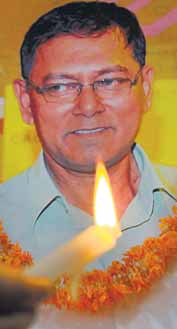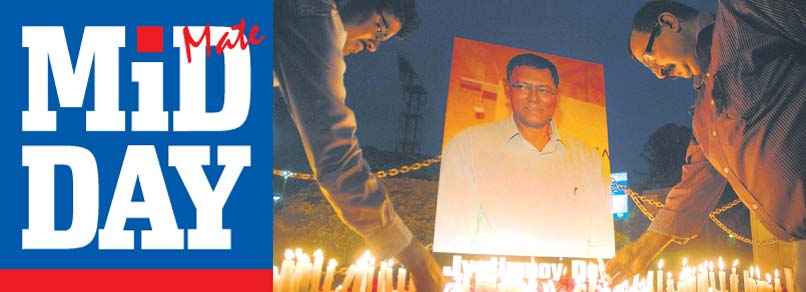We all have our irrational fears. My biggest fear, immediately after being appointed the executive editor of MiD DAY, was not whether I will be able to do justice to the newspaper, but whether a colossus named J Dey would accept me and how he would react when we would first meet in the newsroom.
That fear, like most irrational fears, was unfounded. At the first news meeting I attended, Jyotirmoy Dey, a six-foot-three giant with the physique of a middle-weight boxer, came up to me, grinned his widest grin, shook my hand firmly and said, "Where have you been all these years, Sir?"
Phew!
I first met Dey in 1995 in the MiD DAY newsroom in Tardeo, when I had just been promoted from a trainee sub-editor-cum-writer to a full-fledged feature writer-cum-sub-editor. It was a time of much elation because my salary had also been raised from `1,500 to a princely `2,300. I was 21, while he was already in his mid-30s. I often wondered why a man who had a fairly good job at Hindustan Lever would leave it to join a profession that paid far less; and that, too, as a trainee reporter-cum-photographer.
"My passion is photography," he told me during one of the few conversations I had with him over endless cups of milky tea. "If you give me an entire day with nothing to do but observe birds and photograph them, I will do that free for you. You will have to give me the camera roll, though." In fact, my most vivid memory of him in the cramped MiD DAY office in 1995 is that |

of a tall, well-built man going around with a camera in his hands. And the other memory of him was that he would always refer to himself as J Dey. He would never tell anyone his first name. For several years, therefore, no one knew what "J" stood for.
I was convinced then that he was insane (many years would pass before I realised what that insanity meant).
By 1996, under his first boss (the then City Editor of MiD DAY) Abhay Mokashi, Dey had done reasonably well as a reporter. Mokashi was (and is) a hard taskmaster; and reporters would be mortally scared of facing him because he would pick more holes in their copy than a motorist on a monsoon-ravaged Mumbai road.
Dey, Mokashi told me, would instead stand calmly by his side and take in everything that was said. Years later, when Dey (by now a reporting legend) and a friend of his met Mokashi, the gentle giant introduced Mokashi to his friend as "my first |
guru." "Such was the humility of the man," Mokashi told me when I called him to write a piece for MiD DAY remembering Dey and his work.
To be honest, I really don't know when Dey transformed from a mere face-in-the-crowd reporter to becoming a legend in investigative journalism and a mentor to scores of crime reporters in Mumbai.
But that is irrelevant. What is significant is that Dey, together with S Hussain Zaidi (currently the Mumbai editor of The Asian Age) and a few others, transformed crime reporting and investigative journalism both into an art and a science in the 1990s and well into the first decade of the 21st century. MiD DAY was fortunate to have both in its newsroom at critical junctures in its 32-year-old history. I suspect, though, that even Zaidi would admit that Dey was the first among equals.
Reporters of this generation, growing up on a diet of 24x7 non-stop television news shows where breathless piece-to-camera performances are often confused for fearless and accurate reportage, would have gained from Dey's wisdom and experience. In fact, many already did, but I am afraid they are an endangered species now.
Those who had learned under Dey vouch for his professional integrity and honesty, and his mental strength was an inspiration. In the three months that we worked together in our second innings together at MiD DAY, Dey had become my rock. I would invariably turn to him for the big stories (as, I imagine, other editors would have other editors would have in the past), |
and I am not sure what Iwould have done without him during the difficult phase in May 2011 when our colleague Tarakant Dwivedi alias Akela was arrested under the draconian Official Secrets Act.
I had lost faith, but Dey never wavered for a minute. "Sir," he would tell me at least thrice a day, "We will get Akela out. You don't worry. Remember, we are in the right, they (the police) are the bad guys here."
He was right. After a tough legal battle that lasted a week, we managed to get Akela out on bail. I began to rely on Dey more than ever to pull me out of a hole.
I also relied upon him for a daily dose of humour. He would send me an SMS joke almost every morning which would invariably be based on current political events. I could never figure out how he managed to keep a smiling face despite the pressures of his job which, I am certain, was more stressful than mine. After all, he had exposed criminals, corrupt policemen, greedy bureaucrats and politicians in the pages of our newspaper.
"Thanks to your reporting," I would jokingly tell him, "I will have the privilege of being sent to jail." He would also laugh it off saying, "Don't worry, Sir, you will always have me for company. We will have cockroaches for company at night, and if we feel hungry, we could always munch them."
He was insane, I tell you.
Sachin Kalbag
Executive Editor, MiD DAY |

